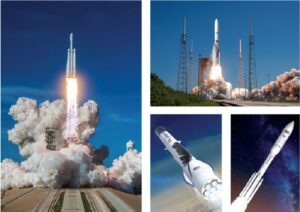Political fight continues over Air Force launch services procurement
By Sandra Erwin

WASHINGTON — Lawmakers and lobbyists are making a last-ditch effort to influence the Air Force’s game plan to procure space launch services.
The Department of the Air Force on behalf of the U.S. Space Force plans to soon announce the two winners of the National Security Space Launch Phase 2 launch services procurement.
Blue Origin, United Launch Alliance, Northrop Grumman and SpaceX are competing for two contracts to fly approximately 34 missions from 2022 to 2027.
“We are proceeding on schedule for an award in summer 2020. There are no significant issues affecting schedule,” the director of the Space Force Launch Enterprise Col. Rob Bongiovi said in a statement to SpaceNews.
The strategy to select two winners from a field of four competitors from the outset was criticized by launch provider Blue Origin. The company argued that the Air Force should select a third provider to widen the competitive playing field and create more business opportunities for the launch industry. That argument drew support from the chairman of the House Armed Services Committee Rep. Adam Smith who represents Blue Origin’s home state of Washington.
Blue Origin, United Launch Alliance, Northrop Grumman and SpaceX are competing for Phase 2 contracts.
The push to add a third provider pitched Blue Origin against ULA, which has fought to prevent any change to the Phase 2 plan.
In a show of political force, a group of 28 lawmakers — from Colorado, Alabama and other states where ULA has manufacturing and launch operations — on May 29 sent a letter to Air Force Secretary Barbara Barrett and Chief of Space Operations Gen. John Raymond asking them to not cave to pressure to add a third provider in Phase 2.
“We must minimize delays or unnecessary changes,” said the letter, a copy of which was obtained by SpaceNews.
The Air Force and the Government Accountability Office “have indicated the national security launch manifest cannot support three or more launch providers,” said the letter.
Blue Origin also has challenged one the provisions of the Phase 2 competition that says that only companies that win a Phase 2 contract will continue to receive Air Force funding for the development of launch vehicles and construction of launch pads.
This funding was awarded in October 2018 to Blue Origin, ULA and Northrop Grumman. The three collectively received $2.3 billion in so-called Launch Service Agreements to be spread over six years.
Blue Origin contends that companies that don’t win Phase 2 should continue to receive LSA funding so they can complete and certify their launch vehicles for a future procurement opportunity.
The May 29 letter urges Barrett and Raymond to not “retroactively change the rules for Phase 2.”
“Congress has only authorized and appropriated funds to support the completion of two launch systems. Absent new analysis or requirements from the Air Force pertaining to Phase 2, development funding should not be extended for launch providers who lost the Launch Service Agreement competition or those not selected as Phase 2 providers,” the letter says.
Smith in recent months has said he would not intervene in the Phase 2 procurement despite his disagreements with the Air Force. But sources told SpaceNews that he might consider introducing language in the 2021 National Defense Authorization Act to extend LSA funding to companies that don’t win Phase 2 and also to SpaceX, the only competitor that did not win an LSA contract in 2018.
The argument for continuing LSA funding gained new life after the release in late April of a RAND Corp. study on the launch industry market commissioned by the Air Force. RAND said terminating LSA funding would drive companies to abandon their efforts to certify commercial launch vehicles for national security launch, creating an opportunity for foreign competitors to gain market share. RAND also suggested the Air Force should provide “tailored support” to a third launch provider until at least 2023 to make sure it has enough launch suppliers with certified vehicles.
An anonymous memo distributed on Capitol Hill refuting the May 29 letter notes that the Air Force “did not dispute the findings or recommendations when it briefed the Hill on the study.”
June 9, 2020 at 06:04PM
via SpaceNews.com read more...

Post a Comment